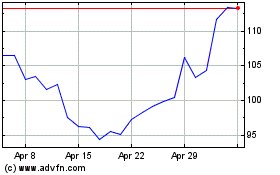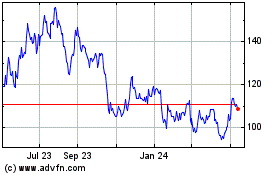By Jing Yang, Dawn Lim and Gordon Lubold
The U.S. government is expected to let Americans continue to
invest in Chinese technology giants Alibaba Group Holding Ltd.,
Tencent Holdings Ltd. and Baidu Inc., after weighing the firms'
alleged ties to China's military against the potential economic
impact of banning them.
New York-listed Alibaba and Baidu, and Hong Kong-listed Tencent,
were among a dozen companies being examined for inclusion in a
Defense Department list of firms deemed to support China's
military, intelligence and security services, according to people
familiar with the matter. U.S. investors have until November to
divest their holdings of any firm on the list.
The U.S. no longer plans to add the three firms, which have
about $1.4 trillion in combined market capitalization, to the list.
Nine other Chinese companies will be added, as well as more than
100 subsidiaries of companies already on the list, the people
said.
The decision caps off a weekslong battle that pit Treasury
officials, who feared widespread selloffs and economic fallout,
against State Department and Pentagon officials seeking a tougher
line against Beijing. In the end, Treasury Secretary Steven Mnuchin
prevailed.
The additions to the list will be submitted to Congress and
released publicly as soon as Wednesday, said two of the people
familiar.
A State Department spokeswoman referred queries to the Defense
Department. "Because the list is not final, we will not comment on
pre-decisional actions," a Defense Department official said.
Treasury didn't immediately comment.
U.S. government officials agreed to keep the three companies off
the list following a meeting of top officials on Tuesday afternoon,
according to people familiar with the matter. After reviewing
classified material, members of the National Security Council,
State Department and Pentagon agreed that the companies should be
classified as linked to Chinese military, intelligence and security
services.
Until the last minute, many in the State Department and Pentagon
believed that this agreement made a compelling case for the
companies to be included in the list once administrative kinks were
ironed out, said the people familiar with the matter.
Mr. Mnuchin disagreed. Without a clear consensus, the group
couldn't proceed with adding the companies to the list.
Mr. Mnuchin has said that he believed including such major
companies would destabilize markets and create economic fallout,
said a person familiar with the matter. Alibaba and Tencent are
China's most valuable publicly listed companies. Treasury has been
concerned about the capital markets impact of extending the ban,
which has already roiled investors and prompted stock exchanges and
index providers to drop some companies, and U.S. investment banks
to delist some derivative products.
Baidu, Alibaba and Tencent, known colloquially by investors as
the 'BAT, ' have long been synonymous with China's internet and
their growing clout in the world's second-largest economy. They are
heavyweights in popular global stock indexes and exchange-traded
funds that track those benchmarks, and their market values have
soared in recent years.
Alibaba's New York-listed American depositary receipts closed
4.3% higher on Wednesday, while Tencent ADRs rose 2.9%.
E-commerce giant Alibaba, which raised $25 billion in a listing
on the New York Stock Exchange in 2014, still holds the record for
the largest U.S. initial public offering. Baidu, which operates a
popular Chinese search engine, has been listed on the Nasdaq Stock
Market since 2005. Tencent, which owns the popular WeChat social
media app and is the world's largest videogame company by revenue,
has ADRs that trade in the U.S. over-the-counter market.
In recent years, government officials and many businesses have
come to regard China as a bigger economic and political rival.
However, Wall Street remains enthusiastic and investors continue to
plow money into China.
Declining to ban the companies "would be a recipe for America
being held hostage to Chinese success in ramping up its investment
exposure in the U.S. capital markets," said Roger Robinson, chief
executive of RWR Advisory Group and former chairman of the
Congressional U.S.-China Economic and Security Review
Commission.
RWR, a research and risk management consulting firm, recently
released a report that argued China is working to develop a
military cloud computing system by enlisting Alibaba, Tencent and
others alongside Chinese military equipment suppliers and Chinese
companies tied to high-tech weapons development programs.
The Pentagon's list of companies with Chinese military ties
first drew attention in mid-November 2020. President Trump at that
time signed an executive order that prohibits American individual
and institutional investors from buying shares of "Communist
Chinese military companies."
Bans on investment in new companies on the list will take effect
in 60 days, after which investors have a year to divest their
holdings.
The list was expanded in December and recently had 35 companies.
They include the privately held parents of China's three listed
telecommunications carriers, as well as China's largest chip maker,
plus surveillance, aerospace, shipbuilding, and construction
companies.
Earlier this month, the New York Stock Exchange moved to delist
the ADRs of China Mobile Ltd., China Telecom Corp. and China Unicom
(Hong Kong) Ltd., forcing many American investors to sell their
stock, with some incurring losses.
With the top ranks of government having weighed in on the
matter, the most important shot at blacklisting the three companies
in the Trump administration has now passed, a U.S. government
official said. It is unclear if the incoming Biden administration
will seek to keep the ban.
Write to Jing Yang at Jing.Yang@wsj.com, Dawn Lim at
dawn.lim@wsj.com and Gordon Lubold at Gordon.Lubold@wsj.com
(END) Dow Jones Newswires
January 13, 2021 17:47 ET (22:47 GMT)
Copyright (c) 2021 Dow Jones & Company, Inc.
Baidu (NASDAQ:BIDU)
Historical Stock Chart
From Mar 2024 to Apr 2024

Baidu (NASDAQ:BIDU)
Historical Stock Chart
From Apr 2023 to Apr 2024
